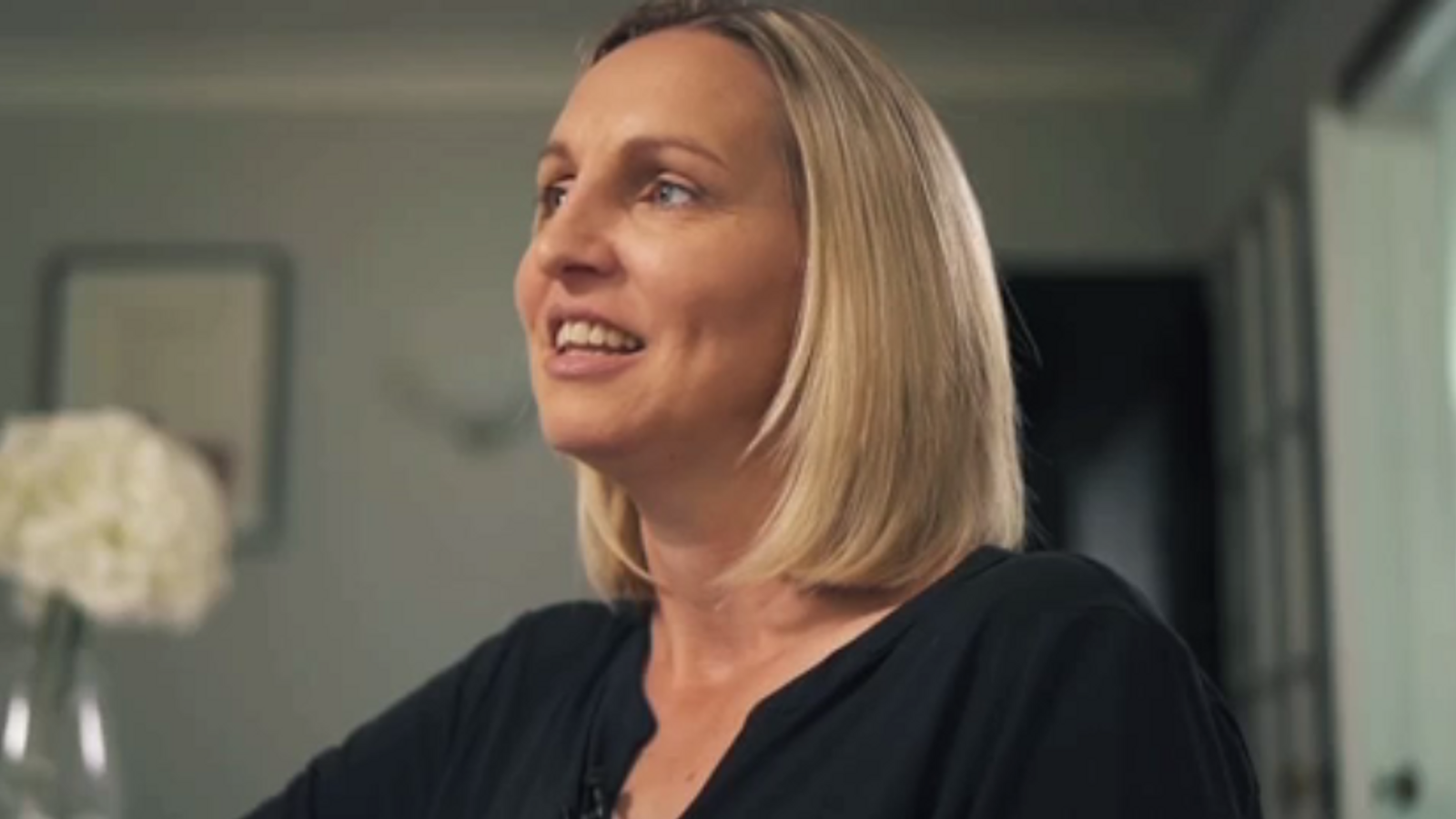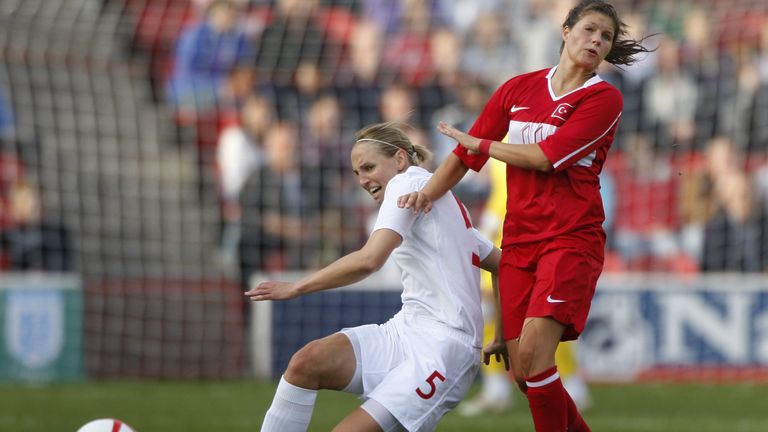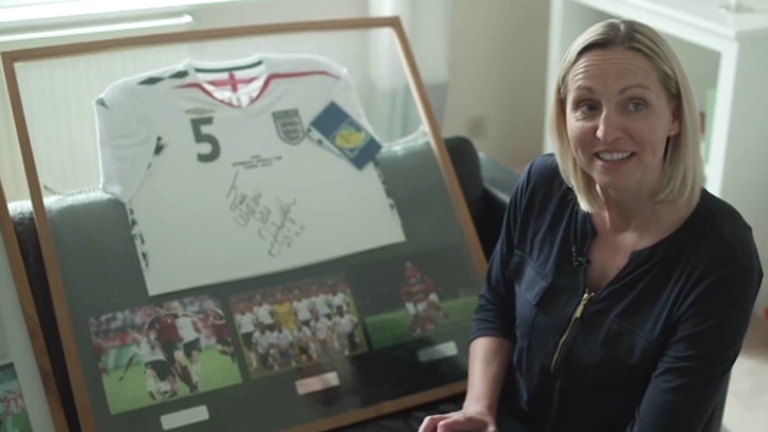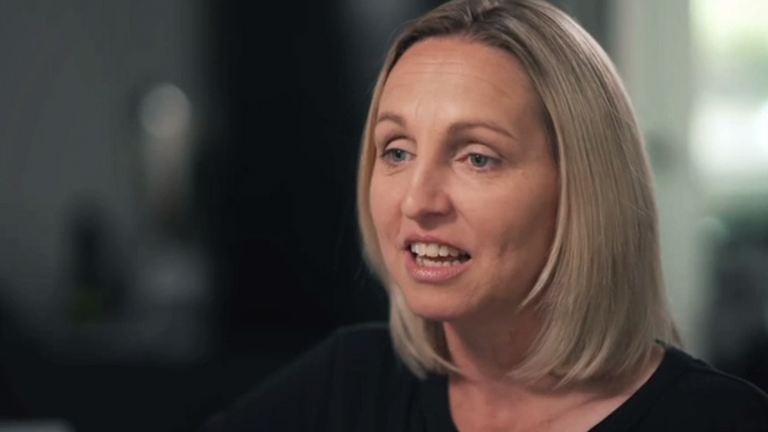
In the latest of Sky Sports News’ Leading the Lionesses series, Faye White discusses her journey to becoming England Women captain, explaining how she went from not playing regularly to winning a few caps and ultimately being handed the armband.
White initially told Sky Sports News how her football career accelerated, saying: “I was one of the first players out of the top league to get a call-up and that was in September 1995.
“You used to be told by letter, and it had all the other names of who’s in the England squad and who’s been selected. And there was mine. I think I was about 16 or 17.
“I’d been selected before. So maybe I was on the radar. We played Arsenal and then suddenly it all happened from there. It was only a couple of years before that I had learned that there was an England team.”
She adds: “It was a bit of a quick turnaround. Just because you were young it wasn’t very much let’s ease her in. It was get up to speed or you are going to be shipped out. You have to prove yourself.”
In 2001, the Euros were a huge step forward in White’s career, representing England at the tournament.
“It wasn’t until 2001, when it was the first Euro game that we played against Germany,” she reflected. “Mo Marley had played the first two games and I was thrown in. We hadn’t qualified. We knew we weren’t going to progress, and I was given a start against Germany.
“It was the hottest day I have ever experienced, playing a football match in the 35-degree heat. It was sink or swim really. I had to perform and show, what it meant to me.
“I’d had a long period in the team, but I hadn’t really played a lot of games, and then quickly into early 2002, I got a few caps and regularly played.”
As White’s international career gained momentum, then-manager Hope Powell told White she believed the defender had the potential to become England’s next captain.
“Hope pulled me aside, on the way back into the tunnel and said come and talk to me. At that time, I didn’t really speak to the coach a lot, I was quite shy,” White said.
“She just said: ‘Today I want you to prove to me that you’re going to be England captain in the future, you can do it’.
“I didn’t really know what that meant, and I’ve suddenly gone from not playing regularly to getting a few caps, for Hope to see that in me.”
After an exciting career, White also revealed some of the challenges her team faced, saying: “I think one thing for me was obviously as a young player going suddenly straight into the seniors, the importance of making younger players coming through feel more accepted and feel more important, like they had a voice.
“But also, it was about showing professionalism and trying to change the mindset, from not only the players, but the press, to remove the stereotypes around amateur footballers.
“We had to be professional before we were considered it and make sure we were doing everything right in our lives, but equally trying to manage that. It was quite hard.
“We had to increase awareness of the game and raise the standards to play at the top level, against the top teams. That would ultimately improve us.”
During White’s career, she also gained 90 caps for England, most of them achieved when she was captain.
Explaining her leadership style, White said: “I might not have been very vocal off the field. But on the field, that’s where I came alive.
“I knew that you had to perform and at the end of the day you have to be that player. Fortunately, in a few World Cups, I managed to do that, and so did others.
“It’s funny how people’s perceptions or behaviours towards you change [when you’re captain]. You’re used to being a normal player on the team to then people acting very differently around you.”
Leah Williamson will be captaining the current England side ahead of the Women’s Euros this summer. Faye also gave some of her own advice, adding: “Don’t put too much pressure on yourself. She’s calm, but ultimately she performs, and she is the figure that will step up.
“I think with captaincy, the media often put more pressure on it. But nowadays there are more leaders in the team.
“Ultimately enjoy it, relish it, learn, be adaptable, be flexible and do it your way.”
Follow Euro 2022 across Sky Sports
Keep up with all the latest from Euro 2022 across Sky Sports and Sky Sports News this summer.
Coverage will be anchored by Sky Sports WSL presenter Caroline Barker, alongside Jessica Creighton and Kyle Walker. Meanwhile, Karen Carney, Sue Smith, Courtney Sweetman-Kirk and Laura Bassett will give analysis throughout the tournament.
They will also be joined by experienced England goalkeeper Karen Bardsley and Manchester City defender Esme Morgan.
The pundits and presenters will work from the Sky Sports Women’s Euro 2022 Mobile Presentation Bus, which will follow the Sky Sports News team around the country to the various stadiums where matches are being played.
In addition, Sky Sports’ Essential Football Podcast will be rebranded for the tournament to Sky Sports Women’s Euros Podcast rom 21 June. Hosted by Charlotte Marsh and Anton Toloui, it will feature exclusive news and player interviews in addition to a strong programme line up around the tournament.
Euro 2022: The groups…
Group A: England, Austria, Norway, Northern Ireland
Group B: Germany, Denmark, Spain, Finland
Group C: Netherlands, Sweden, Portugal, Switzerland
Group D: France, Italy, Belgium, Iceland
Euro 2022: The schedule…
Group stage
Wednesday July 6
Group A: England vs Austria – kick off 8pm, Old Trafford
Thursday July 7
Group A: Norway vs Northern Ireland – kick off 8pm, St Mary’s
Friday July 8
Group B: Spain vs Finland – kick off 5pm, Stadium MK
Group B: Germany vs Denmark – kick off 8pm, London Community Stadium
Saturday July 9
Group C: Portugal vs Switzerland – kick off 5pm, Leigh Sports Village
Group C: Netherlands vs Sweden – kick off 8pm, Bramall Lane
Sunday July 10
Group D: Belgium vs Iceland – kick off 5pm, Manchester City Academy Stadium
Group D: France vs Italy – kick off 8pm, New York Stadium
Monday July 11
Group A: Austria vs Northern Ireland – kick off 5pm, St Mary’s
Group A: England v Norway – kick off 8pm, Brighton and Hove Community Stadium
Tuesday July 12
Group B: Denmark vs Finland – kick off 5pm, Stadium MK
Group B: Germany vs Spain – kick off 8pm, London Community Stadium
Wednesday July 13
Group C: Sweden vs Switzerland – kick off 5pm, Bramall Lane
Group C: Netherlands v Portugal – kick off 8pm, Leigh Sports Village
Thursday July 14
Group D: Italy vs Iceland – kick off 5pm, Manchester City Academy Stadium
Group D: France vs Belgium – kick off 8pm, New York Stadium
Friday July 15
Group A: Northern Ireland v England – kick off 8pm, St Mary’s
Group A: Austria vs Norway – kick off 8pm, Brighton and Hove Community Stadium
Saturday July 16
Group B: Finland vs Germany – kick off 8pm, Stadium MK
Group B: Denmark vs Spain – kick off 8pm, London Community Stadium
Sunday July 17
Group C: Switzerland vs Netherlands – kick off 5pm, Bramall Lane
Group C: Sweden vs Portugal – kick off 5pm, Leigh Sports Village
Monday July 18
Group D: Iceland vs France – kick off 8pm, New York Stadium
Group D: Italy vs Belgium – kick off 8pm, Manchester City Academy Stadium
Knockout phase
Quarter-finals
Wednesday July 20
Quarter-final 1: Winners Group A v Runners-up Group B – kick off 8pm, Brighton and Hove Community Stadium
Thursday July 21
Quarter-final 2: Winners Group B v Runners-up Group A – kick off 8pm, London Community Stadium
Friday July 22
Quarter-final 3: Winners Group C v Runners-up Group D – kick off 8pm, Leigh Sports Village
Quarter-final 4: Winners Group D v Runners-up Group C – kick off 8pm, New York Stadium
Semi-finals
Tuesday July 26
Semi-final 1: Winners quarter-final 1 v Winners quarter-final 3 – kick off 8pm, Bramall Lane
Wednesday July 27
Semi-final 2: Winners quarter-final 2 v Winners quarter-final 4 – kick-off 8pm, Stadium MK
Final
Sunday July 31
Winners semi-final 1 v Winners semi-final 2 – kick off 5pm, Wembley


